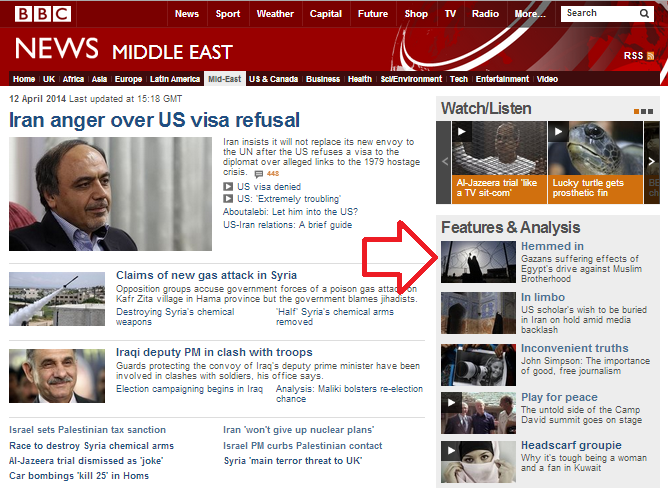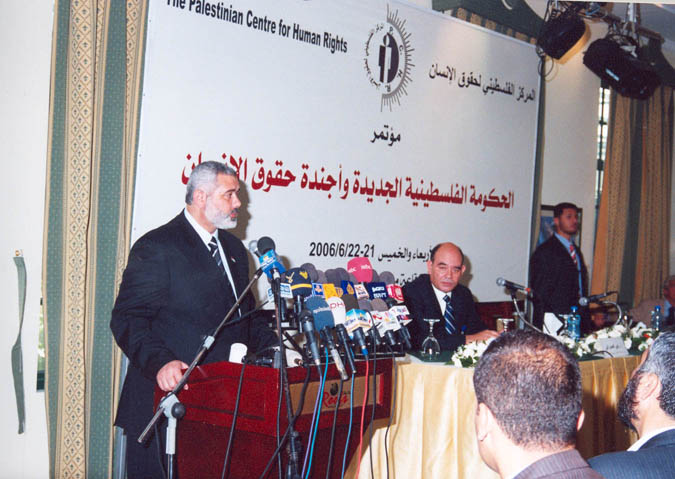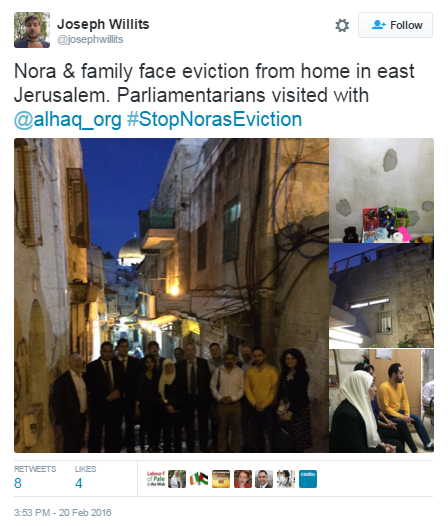On April 12th an article by the BBC Jerusalem Bureau’s Yolande Knell appeared in the ‘Features & Analysis’ section of the BBC News website’s Middle East page under the headline “Egypt gives Hamas and Gaza the cold shoulder“. On the Middle East page itself, the link was presented under the title “Hemmed in”, with the sub-heading “Gazans suffering effects of Egypt’s drive against Muslim Brotherhood”.
The article is actually a near transcript of an audio report by Knell which was broadcast in the April 12th edition of ‘From Our Own Correspondent” on BBC Radio 4. The audio version of the report can be heard here from around 12:23 or as a podcast here. Presenter Kate Adie opens her introduction of Knell’s item with a gratuitous context-free statement which, like a recent BBC News article on the same subject, neglects to inform audiences that “economic sanctions” are actually a way of trying to reclaim over $400 million of Palestinian Authority debt to Israel.
“Israel this week said it would bring in new economic sanctions against the Palestinians. The move came amid mounting pessimism over the eventual outcome of the ongoing peace talks between the two sides. And in Gaza it came as the Islamic militant group Hamas was facing its deepest crisis since it took control of the Strip in 2007. Hamas is regarded as a terrorist group by Israel, the United States and the European Union. And now, as Yolande Knell has been finding out, the interim government in neighbouring Egypt has begun to take a tougher approach as well.”
Had she simply added the two words ‘among others’ after her incomplete list of countries which designate Hamas as a terrorist organization, Adie could have avoided the pitfall of inaccuracy caused by her elimination of Canada, Japan, Australia and New Zealand from that list.
Since the departure of Jon Donnison last summer, the BBC has not had a permanent foreign correspondent in the Gaza Strip, but Knell has been among those paying occasional visits and reporting from there. Like most of her previous reports from the past few months (see for example here, here and here), this one too is an exercise in context-free pathos and promotion of the theme of poor, blameless, downtrodden Gazans.
The most striking feature of Knell’s report is its framing of Egyptian actions and policy solely as a “crackdown on the Muslim Brotherhood” and the failure to make any mention of the connections between the Gaza Strip and terrorist activity in the northern Sinai.
“Egypt’s crackdown on the Muslim Brotherhood has led to a sharp deterioration in relations with the Islamist group Hamas in neighbouring Gaza, and the people there are paying the price. […]
Relations with Gaza’s Hamas government have dramatically worsened since Egypt’s elected president Mohammed Morsi was ousted last summer following mass protests.
Hamas was closely aligned with Morsi and his Muslim Brotherhood movement.
Now Cairo’s new military-backed authorities accuse Hamas of meddling in their affairs. They have banned all its activities.
And ordinary Palestinians feel the consequences.”
Also notable is Knell’s anodyne portrayal of the cross-border smuggling tunnels and her failure to clarify to audiences that Egypt’s actions against those tunnels were not inspired by their use for the smuggling of commercial goods, but because they are also used to move weapons and Jihadist fighters in and out of sovereign Egyptian territory.
“Already hundreds of smuggling tunnels under Egypt’s border have been destroyed by its troops.
They used to act as a lifeline to get around restrictions that Israel tightened seven years ago after Hamas wrested control of the Palestinian territory from Fatah forces loyal to the president, Mahmoud Abbas.
Trade is visibly down at a market in southern Gaza.
“Nobody can bring in goods any more and people are suffering,” says a grizzled stallholder, Waleed, “our economy’s at zero.”
Without the tunnel business, unemployment has risen sharply.
There is a shortage of building materials.
And there is no cheap, subsidised Egyptian fuel. That means longer power cuts.”
Of course Knell does not bother to make any attempt to provide audiences with any relevant background as to why it is essential that there are limitations on the entry of dual-use goods – including some building materials – to the Gaza Strip and she fails to clarify that legitimate construction projects are able to receive the supplies they need. Neither does she inform audiences of the full background to the Gaza Strip’s electricity crisis.
“Recent Egyptian military activity rendered out of commission hundreds of tunnels that once connected Sinai and Gaza and were used to import one million liters of fuel into Gaza each day. As a result, Hamas has no choice but to purchase fuel from Israel via the Palestinian Authority at prices similar to those found in the Israeli market, namely over seven shekels ($2) per liter of gasoline. That is a major problem for private car owners.
The more acute problem is that fuel is needed to operate the Gaza power plant that generates the majority of the local electricity. The Palestinian Authority purchases a liter of fuel for the power plant for approximately 4 shekels from Israeli gas companies and has tried to sell it to Hamas for almost double, including excise tax.
Hamas has rejected those prices outright and stopped purchasing fuel for its power plant. The dramatic consequence was that the power plant has shut down and the electricity supply has been completely disrupted. The PA refuses to waive the excise tax, a critical part of its own budget. And the residents of Gaza are the ones who suffer.”
Knell goes on to quote Raji Sourani, whom she describes simply as a “human rights campaigner” without clarifying his link to the PCHR as demanded by BBC editorial guidelines. Using Sourani’s words as a hook, she implies that the recent barrage of missile attacks on Israeli civilians in communities surrounding the Gaza Strip was the inevitable – and hence presumably ‘understandable’ – result of economic frustration.

“Back in Gaza City, I find the veteran human rights campaigner Raji Sourani looking uncharacteristically miserable.
“Egypt’s added another dimension to this siege that’s suffocated Gaza socially and economically. It’s a collective punishment. We’re reduced to hostages and beggars,” he says.
“And I don’t think anybody should expect Gazans to be good victims. Things will ultimately explode.”
Already there have been explosions. Last month fighters from Islamic Jihad in Gaza launched a barrage of rockets at their historic enemy, Israel.”
That is quite a remarkable piece of whitewashing of the motivations of an internationally proscribed terrorist organization (which, in the audio version of the report is revealingly described by Knell simply as “an armed group more extreme than Hamas”) inspired by religious supremacist ideology and funded by Iran. Knell’s downplaying of Hamas’ extremism also includes the failure to mention its recently improved ties with Iran and a distinctly woolly portrayal of the latest Hamas rally in Gaza which the BBC failed to report in English at the time.
“Hamas – which fell out with its other regional patrons Syria and Iran earlier during the Arab uprisings – was left feeling even more squeezed.
A massive rally held soon after in Gaza was meant as a show of force.
Hamas leaders spoke defiantly about Israel and the failing peace talks led by their political rival, President Abbas.
But some also criticised Egypt and what they called its military coup.”
Once again BBC audiences are herded towards focusing their attentions exclusively on the issue of the economic difficulties facing the ordinary residents of the Gaza Strip without any proper context being provided regarding the responsibility of the ruling Hamas regime for those very real hardships. And once again, that policy actively prevents BBC audiences from being able to form an understanding of international issues based on the full range of facts.
Related Articles:
BBC’s Knell amplifies Hamas propaganda, downplays its terror designation




